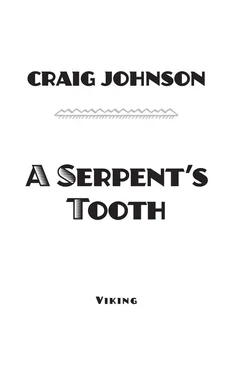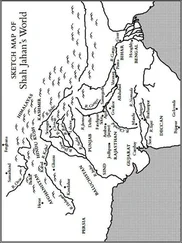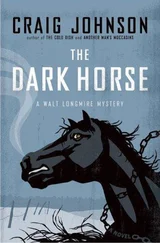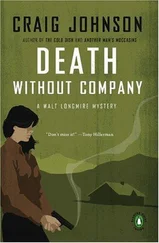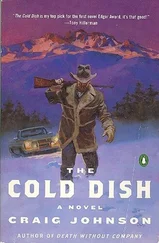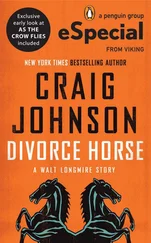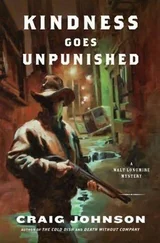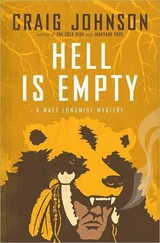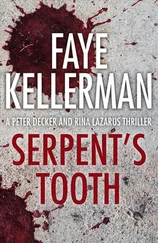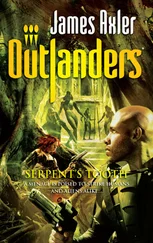Henry stood in the back periodically checking the horizon with the binoculars with his arms draped over the padded roll bar.
“Anything?”
“Just the unfurling and pastoral beauty that is Wyoming.”
I glanced at Vic. “Forever West?”
“No fucking way.”
The slope gradually led to a shallow valley that headed south, so I followed the wide dirt road and tried not to look off the edge that dropped into a tributary of Salt Creek.
Despite Vic’s remarks, it was beautiful country, even the tang of turned earth where they had graded the road couldn’t spoil the environs. There were pillars of rock ahead, and what looked like another canyon that dropped off farther into the narrow aperture to the west like sentinels into an ancient sea—a place from which humidity had departed forever. The moon was setting, pulling at tides that were no longer here, but you could feel the buoyancy of its light as it struck the rocks.
I noticed a batch of sage and tumbleweeds to my right and slowed. It looked like the entrance to a road that they had cut and then abandoned, but it was worth an investigation. I slowed the Jeep and pulled up to the somewhat hidden fork. Henry climbed out with the ArmaLite and looked at the brush alongside the road. Carefully, he reached down and took hold of one of the branches and pulled it; the rest of the vegetation pivoted along with its brethren, evidently wired together.
He looked back and motioned for me to drive through, which I did, and then pulled to the side. He walked over and made a cutting gesture at his throat, and I shut off the engine.
His head was cocked as if he were listening to something. I glanced at Vic, and we both climbed out and followed the Bear down the road toward the sound of heavy equipment. The noise echoed off the rock walls of the steep canyon, and it must’ve been an undertaking to put the road in. Evidently, they had thought it would be worth it.
We turned a sharp corner and suddenly, far below, there was a city.
The usual lights and illumination that generally accompanied a drilling operation were not there, and the entire drilling rig and outlying buildings were painted a flat desert tan. It was an operation, a big one, and in spite of the camouflage pattern, I was still amazed that no one had noticed it.
“How the hell do you keep something like this from being seen?”
The Cheyenne Nation started to speak but then looked up.
I followed his eyes—there were no stars and no setting moon. I allowed mine to adjust to the darkness and could see what was blocking the sky: a mesh of guide wires running across the distance of the canyon interlaced with gillie material—more than a mile of it.
“Holy crap.” Vic stepped forward, looking at the gigantic canopy. “I’m impressed.”
I made a noise in my throat. “But how do you get the oil out of here?”
The Bear’s hand came up and pointed at a number of polished aluminum shapes parked against the base of the drilling rig, looking incongruous amid the military paint scheme.
I took his binoculars and could see the milk trucks being filled with the last tankers full of oil. “I’ll be damned.” I passed the binoculars to Vic and stood there, taking in the magnitude of the operation, unsure of what to do next.
She surveyed the entire scene. “I don’t get it, though. They can’t be making enough money to support all of this long term—what’s the next step?”
“I don’t know.”
Henry’s voice sounded from the darkness. “It looks to me like they are breaking things down and loading up just a few more tankers. I am betting they will be out of here by morning—just leave behind a skeleton crew to dynamite the canyon and nobody but us will be the wiser.”
Vic nodded her head. “Smart.”
I nodded. “Very smart.”
The Bear remained silent for a moment and shook his head. “Not so smart.”
We turned and looked at him as he pointed at the road on which we stood. “Only one way out.”
15
The milk truck driver wasn’t sure what to make of the shapely woman standing in front of the Jeep with the hood up near where the first sentry had been positioned, but he knew what to make of the .45 Colt I poked through the driver’s-side window into his left ear.
As I cuffed him to the Jeep’s spare along with Carlson, I started having second thoughts and figured maybe we should find something larger to pin them to. I turned to Henry. “Do we need the Jeep anymore?”
“For speedy egress possibly.”
“If I cuff both of these guys to the spare they could just pick it up and walk off with it.”
Vic looked around as she closed the hood on the Rubicon. “Where the hell would they go?”
She had a point.
I turned back and looked at the two of them, the one from Minnesota, the other from Louisiana. “You guys aren’t that stupid, are you?”
They looked at each other and then back to me, their faces blank—and I was not reassured.
“Look, there isn’t much out here that can eat you, but what can eat you is the distance, okay? If the two of you go on walkabout in the dark you’re likely to get hurt or, more important, get lost and then you’ll just be two corpses handcuffed to a spare tire—another great mystery of the high plains. Got me?”
They looked around again.
I was still not reassured.
I threw a thumb toward my undersheriff. “Or I will let her shoot you.”
They seemed to get that last part.
I joined the squad back on the road, sighed deeply, and thought what a nice cool morning it was if you weren’t up to the types of things we were up to. “I’m pretty sure I’m the only one who knows how to drive this thing.” I studied the length of the milk truck and made some calculations.
The Bear stiffened and shook his head. “You are also the better shot.”
I glanced at the eighteen-wheeler. “It’s a tanker; I think you’ll hit it.”
He nodded reluctantly. “So, what is going to happen?”
“On Highway 1 in Vietnam, I saw a tracer round hit an oil truck.”
Vic leaned forward into my line of thought. “And?”
“Well, it was aircraft fuel, not crude. . . .” They both stared at me. “And it was more than one tracer, probably a bunch of them.” They continued to stare at me. “But it blew like a sailor on a three-day drunk.”
The Bear’s voice rumbled. “How many Claymores?”
Since Vietnam and our association with Claymore directional mines, Henry and I had developed our own private method of determining a demolition scale. “Eight.”
His eyes quickly traveled from Vic’s to mine. “Eight?”
“Maybe seven, but that was high-octane with lots of tracers.”
He raised an eyebrow, the closest thing the Cheyenne Nation did to a guffaw. “The concussion will collapse the canyon.”
“It’s crude oil—won’t be anywhere near that bad.”
Vic stretched a hand out and placed it on my arm. “How about we simply jackknife the trailer on the road?”
“We’ll fall into the creek. I think I’d rather blow it up and have them have to put it out, and I want a lot of smoke and noise.” I reached over and tapped the extended barrel of the TAC-50. “One blue-point from this should do that.” Henry still looked worried. “I don’t want anyone killed—just want to plug the bottle until we can get the weight of the law to swing to our side.”
Our attention was drawn to two individuals carrying a spare tire between them. I guess they were that stupid.
“Hey, where do you two idiots think you’re going?”
The Cajun was the first to answer. “I was looking to see if there was another lawn chair in the Jeep?”
The Minnesotan was next, and his tone was a little indignant as he pointed toward the cooler. “We’re out of water and figured we’d get a drink. Is that okay?”
Читать дальше
